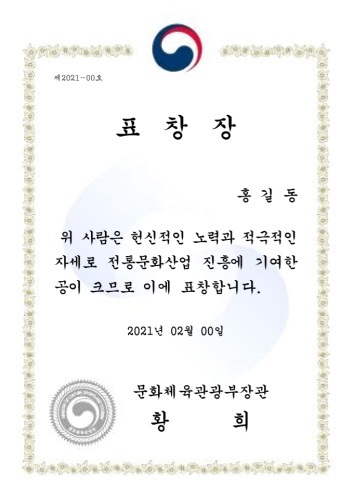Culture Ministry to use ‘hanji’ for award certificates
By Kim Hae-yeonPublished : Feb. 16, 2021 - 15:43

Starting this year, award certificates presented by the Ministry of Culture, Sports and Tourism will be on “hanji,” Korea’s traditional paper handmade from mulberry trees. The purpose is to support the nation’s hanji industry, which is suffering from a lack of demand despite its competitive quality, the ministry announced.
The ministry stated on Tuesday that they had established a hanji consultative body in October 2020, with the participation of both central and local governments, to learn what industry experts are seeking to create demand. In meetings, the experts asked the ministry to use hanji as paper for certificates, and the ministry took action on the idea.
According to the ministry, hanji is recognized for its durability. Hanji does not tear easily, compared to other forms of paper.
In 2017, the Louvre Museum in France adopted hanji as the paper used for restoring historical relics, after comparing it with Japan’s traditional paper, washi, made from gampi tree, and China’s, xuan, commonly known as rice paper. Since 2016, Italy’s Higher Institute for Conservation and Restoration certified five types of hanji as “cultural heritage repair and restoration papers.”
The ministry plans to utilize hanji not only on making award certificates, but also to produce public goods such as visitors’ books, and distributing them to embassies and cultural centers, along with promotion for local festivals and programs that facilitate the understanding and use of traditional papers.
“We hope that there will be increased use of hanji in the public sector through the use of certifications and others, and we will do our best to promote the excellence of hanji for it to stand strong as a traditional culture,” said cultural policy officer Lee Jin-sik.
By Kim Hae-yeon (hykim@heraldcorp.com)
The ministry stated on Tuesday that they had established a hanji consultative body in October 2020, with the participation of both central and local governments, to learn what industry experts are seeking to create demand. In meetings, the experts asked the ministry to use hanji as paper for certificates, and the ministry took action on the idea.
According to the ministry, hanji is recognized for its durability. Hanji does not tear easily, compared to other forms of paper.
In 2017, the Louvre Museum in France adopted hanji as the paper used for restoring historical relics, after comparing it with Japan’s traditional paper, washi, made from gampi tree, and China’s, xuan, commonly known as rice paper. Since 2016, Italy’s Higher Institute for Conservation and Restoration certified five types of hanji as “cultural heritage repair and restoration papers.”
The ministry plans to utilize hanji not only on making award certificates, but also to produce public goods such as visitors’ books, and distributing them to embassies and cultural centers, along with promotion for local festivals and programs that facilitate the understanding and use of traditional papers.
“We hope that there will be increased use of hanji in the public sector through the use of certifications and others, and we will do our best to promote the excellence of hanji for it to stand strong as a traditional culture,” said cultural policy officer Lee Jin-sik.
By Kim Hae-yeon (hykim@heraldcorp.com)









![[Kim Seong-kon] Democracy and the future of South Korea](http://res.heraldm.com/phpwas/restmb_idxmake.php?idx=644&simg=/content/image/2024/04/16/20240416050802_0.jpg&u=)








![[KH Explains] Hyundai's full hybrid edge to pay off amid slow transition to pure EVs](http://res.heraldm.com/phpwas/restmb_idxmake.php?idx=652&simg=/content/image/2024/04/18/20240418050645_0.jpg&u=20240418181020)

![[Today’s K-pop] Zico drops snippet of collaboration with Jennie](http://res.heraldm.com/phpwas/restmb_idxmake.php?idx=642&simg=/content/image/2024/04/18/20240418050702_0.jpg&u=)